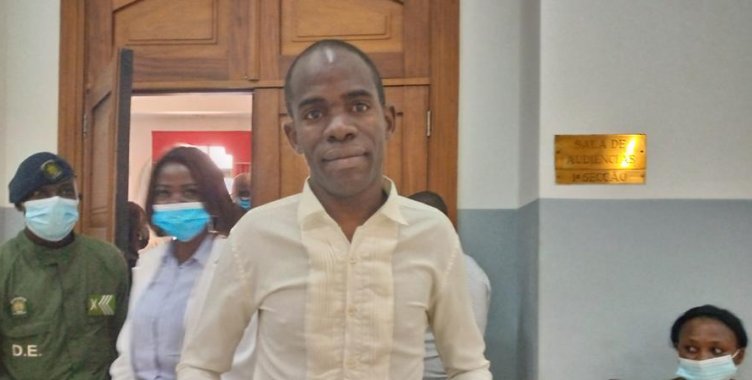The information was transmitted this Thursday by Judge Daniel Ferreira at the end of the first day of the trial hearing of the activist, detained for eight months, which took place in the 1st section of the Luanda District Court, under heavy police presence at the entrance to the organ facilities.
'Ta Nice Neutro', a well-known Angolan activist, was arrested on January 14, 2022, at the premises of the Criminal Investigation Service (SIC), in Luanda, while allegedly making a live video on social media where he uttered insulting words against the authorities and demanded the release of activist Luther Campo, arrested two years earlier.
This Thursday, in the production of evidence for the discovery of the material truth, he "recognized" that he had been excessive in the words he used, in another displayed at the court hearing, against the Angolan authorities, considering that he was tainted by "discontent over the country's socio-economic situation".
The defendant, at the instance of the judge in the case, Daniel Ferreira, apologized for the words he used, in videos shared on social media, against State bodies, admitting "ignorance" of the new penalties of the new Angolan Criminal Procedure Code (CPP).
Public instigation of crime, outrage against the State, its symbols and organs, rebellion and resistance against an official are four crimes imputed by the Public Ministry (MP) to the defendant, reaffirmed by the MP magistrate in the session.
The defense, in the context of the answer, said that the MP's accusation contains omissions, inaccuracies and obscure issues, with the activist's representative, Francisco Muteka, referring that the content of the accusatory piece was "false".
Three deponents, all activists, were listed by the defense and in their interventions they denied that 'Ta Nice Neutro', with whom they have participated in different demonstrations, broke any police cordon or committed acts of rebellion, as stated in the indictment.
The three deponents/captors of SIC, listed by the court, did not appear at this Thursday's hearing and, according to the judge, despite the letters sent to the police agency, "the court did not obtain any response and did not deign to respond".
And in the closing arguments, the MP magistrate maintained the accusation that weighs on the accused and also asked for his conviction "to discourage practices that instigate hatred, violence and rebellion".
Lawyer Francisco Muteka mentioned, in his allegations, that the evidence confronted by the MP was "sufficiently fragile" for which, he defended, "they should not be taken into consideration by the court" and asked for the acquittal of 'Ta Nice Neutro'.
"We do ask for the acquittal of the accused due to the fact that there are no probative elements in the process. The criminal procedure has rules and the rules are clear and objective. In the context of democratic criminal proceedings, everything must be proved in the context of the discussion of the trial", the lawyer told journalists at the end of the hearing.
Muteka also regretted the health condition of the defendant, who suffers from hemorrhoids, and asked the court to review his prison situation so that he can take care of his health outside the Hospital Prisão São Paulo, in Luanda.
Police officers were present this Thursday, in considerable numbers, at the entrance of the Luanda District Court, on Rua Rainha Ginga, and even put up barriers to traffic, that is, they blocked both lanes on the perimeter.
Some activists wanted to protest in front of the court in "solidarity" with their "brother" 'Ta Nice Neutro' to "demand immediate release" of the also considered "political prisoner".
Osvaldo Caholo, a well-known activist of the 15+2 process of the José Eduardo dos Santos era, attended the 'Ta Nice Neutro' trial and considered the session "another maneuver by the ruling MPLA regime, the ruling party, which uses the courts to disseminate fear and inhibit the freedom of expression of Angolans".
"This trial is clearly political, it can be seen that the judge, in his questions, even threatens the defendant", said Caholo, who also condemned the police apparatus outside the court's premises.
"It is clearly (the presence of the police in front of the court) to prevent a demonstration next to the court because there are activists in the vicinity and so they even conditioned the freedom of people to circulate by car here", stressed Osvaldo Caholo.







